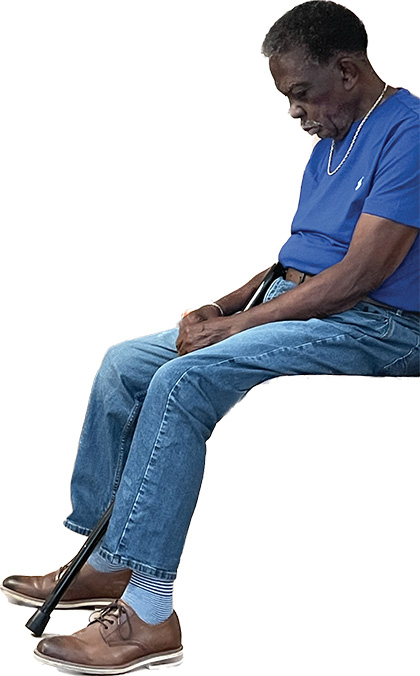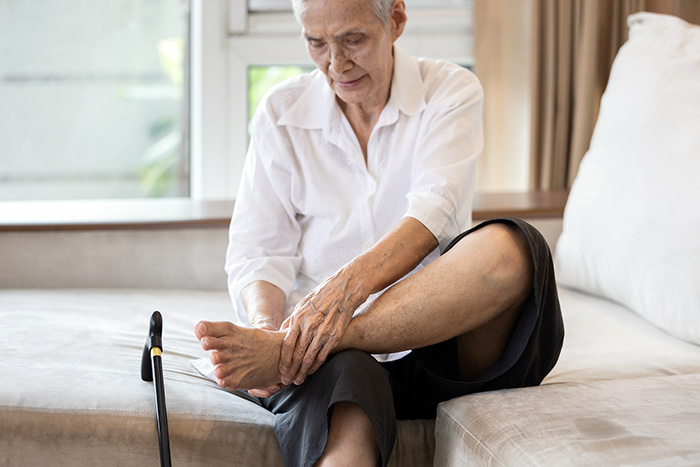 Many don’t appreciate the importance of caring for their feet or value the benefit of wearing well-fitting, quality shoes and socks. It is extremely important for athletes, diabetics, the elderly and those who are on their feet a lot to take special care of their feet to reduce their likelihood of becoming a good candidate for the TV show “My Feet Are Killing Me.”
Many don’t appreciate the importance of caring for their feet or value the benefit of wearing well-fitting, quality shoes and socks. It is extremely important for athletes, diabetics, the elderly and those who are on their feet a lot to take special care of their feet to reduce their likelihood of becoming a good candidate for the TV show “My Feet Are Killing Me.”
I recently noticed for the second time in my life that my daddy’s toenails were unusually long based on his grooming preference. Although daddy still takes meticulous care of his nails, it has become evident that he can’t comfortably and safely care for his feet any longer. So, I’ve added this task to my caregiving duties.
I’m a bit more cautious about caring for momma’s feet because she’s diabetic, and a cut or tear can take a long time to heal and be very detrimental. While momma still has flexibility enough to safely bend over or prop her feet up, she no longer has the dexterity to handle the task well. So, I and my best friend’s daughter, Mariah, manage her manicures and pedicures.
All of this may seem trivial, but caring for the elderly’s feet is very important. The feet can offer insight about potential ailments and can cause or exacerbate health issues. Failure to properly care for their feet also can cause balance and mobility problems, which could lead to a bad fall and a plethora of related issues.
Here are some basic tips:
CHECK FOR SWELLING
Both my parents are on a medication that can cause swelling when they consume too much sodium and not enough water and get an inadequate amount of physical activity. Additionally, daddy is prone to blood clots. Being attentive to his podiatric posture has helped with a quick diagnosis and subsequent treatment of a blood clot in his leg.
REMOVE SOCKS AND SHOES TO OBSERVE
My parents, like many elderly people, wear socks most of the time. It is important to remove socks and slippers regularly to inspect their feet and nails. If you see something suspicious, report it immediately to their physician or note it for their next doctor’s visit.
TAKE PICS
I have developed a very helpful habit of taking pics to document unusual or concerning things that I observe in my parents to show during doctor visits. If I’m very concerned, I will even drop by the doctor’s office to show the receptionist and/or nurse to ask whether the concern should be addressed immediately. Pictures provide a much more vivid image than any verbal description. Pictures of daddy’s swollen legs prompted an immediate visit to his primary physician. The swollen area had decreased by the time we visited the doctor and later increased again. Having pictures days helped his physician diagnose what was happening.
ENSURE PROPER WASHING AND DRYING
During my parents’ bath time, I help wash their backs and feet to ensure they are cleaned thoroughly and properly. Additionally, I help them dry off those areas completely before putting on clothing and socks to prevent breeding areas for bacteria.
SOFTEN FEET AND NAILS BEFORE TRIMMING
If you are comfortable enough to provide podiatric care to your loved ones yourself, please do so immediately after they have showered or bathed and/or soak their feet first to soften the skin. This makes the pedicure much easier and helps prevent tears and cuts.
KNOW YOUR PATIENT
For daddy, I must set a whole mood and create a production for his pedicures. I have him sit in his favorite chair in the living room after he has eaten. I turn the TV on and select a show that will hold his attention. Because he loves the lotion and massage at the end, I spend more time doing that for him.
Momma’s manicures and pedicures generally require a bit of cleanup from her attempts to cut and polish her own nails. I do not lotion and massage her feet or hands because she does not need it or like it.
PURCHASE PROPER FOOTWEAR
Properly fitting socks and shoes can help reduce foot problems, increase mobility and balance and help reduce falls.
CONTACT A PODIATRIST OR FOOT SPECIALIST
If you are uncomfortable providing podiatric care to your loved one or suspect he or she is having foot issues, make an appointment to see a podiatrist or foot specialist. Some home-health agencies can send someone to address your loved one’s podiatric needs. Also, nail salons can handle routine maintenance.




3 Comments
Leave a Reply